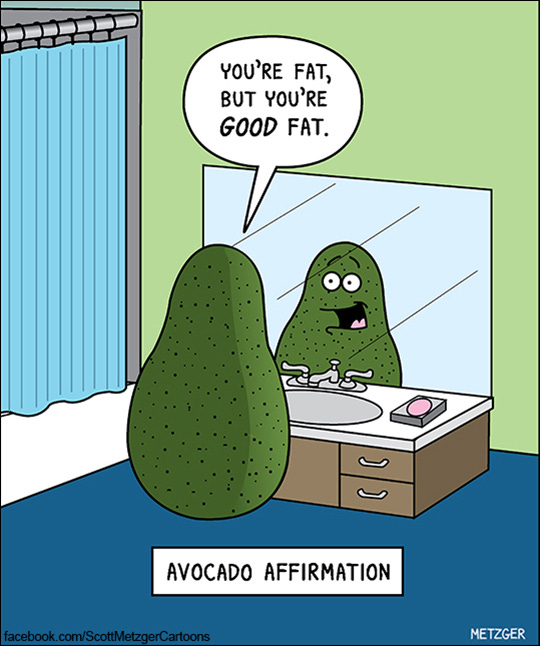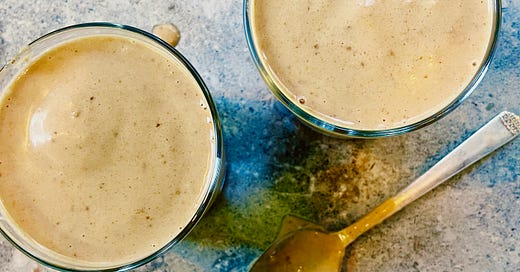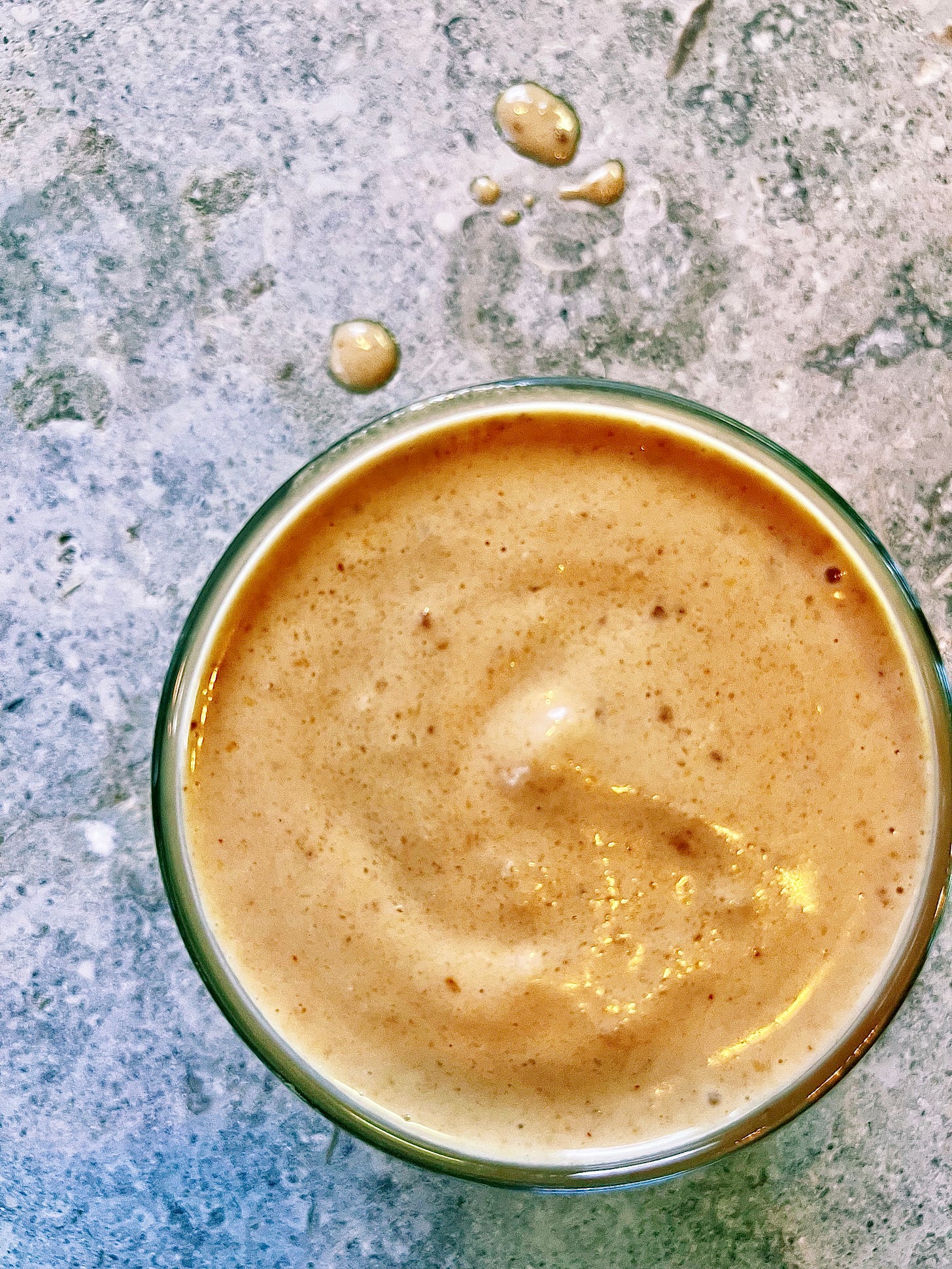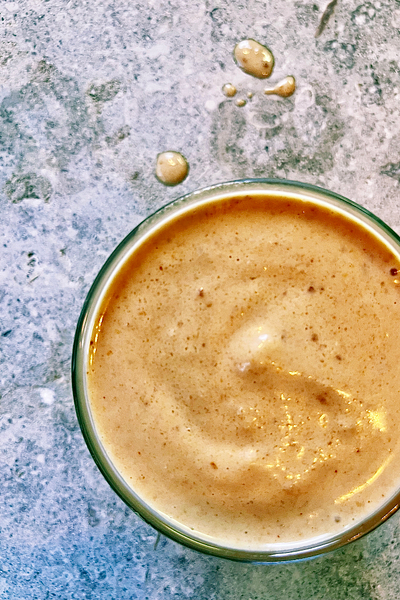The Coffee Date Smoothie
The bracing way to enjoy coffee with a good dose of protein, and an alternative for tea lovers, too
Hello there, everyone. I am writing to you from my favorite spot on the deck at home while enjoying my first cup of coffee of the morning. Not only does science solidly support coffee as a brain-protective drink, it is one of my greatest pleasures. We’ve been diving into the topic of protein all this month in the newsletter. With this Coffee Date Smoothie recipe, you can combine your love of coffee with a good dose of protein. (Tea drinkers: I have a tea alternative for you as well!)
To catch up, read this post about brain-healthy protein sources, and this one about how much protein you need.
First, a few fun facts about coffee and brain health.
Coffee is a Neuroprotective Drink
It’s a common misconception that coffee is harmful to your health. Most studies show that a daily coffee habit is good for overall health and may reduce the risk of neurodegenerative diseases like Alzheimer’s and Parkinson’s.
The best way to drink coffee, from a brain health perspective, is perfectly black. Dousing coffee with sweeteners and unhealthy fats reduces its overall benefit. Dairy proteins bind to antioxidants, making them less absorbable. And added sugar in a daily beverage can contribute to poor metabolic—and brain—health. If you must lighten your coffee, a dash of unsweetened plant milk is a good choice.
Here’s What Coffee Can Do For Your Brain:
Coffee contains more than 200 bioactive substances, many of which are neuroprotective.
While caffeine has been shown to have anti-amyloid action, one of the flavonoids—quercetin—may be the primary brain-healthy ingredient. Decaffeinated coffee has plenty of flavonoids to make it neuroprotective.
Drinking 3 or more cups of coffee a day is associated with a 21% lower risk of dying from heart disease and an 18% lower risk of dying from any cause.
In the U.K. Biobank study, drinking up to 3 cups a day was associated with more favorable cardiovascular aging, such as fewer cases of stroke and death from heart disease.
Coffee drinkers are less likely to be diagnosed with Alzheimer’s, and its use is strongly linked to less Parksinson’s disease, too.
This study analysis showed that the risk of cognitive decline goes down with each cup of coffee consumed each day, with a maximum benefit at about 4 cups.
When researchers looked at coffee drinkers’ brains with imaging to detect amyloid protein, they found a linear relationship: starting at 2 or more cups per day, less amyloid was detected over time.
Many studies on coffee’s benefits were done in countries where coffee is taken black, and coffee drinking is a social activity. It’s difficult to tease out the impact of actual coffee from the beneficial effect of gathering with friends daily or pausing to enjoy a cup solo.
Not a Coffee Drinker? Make This a Chai Date Smoothie
If tea is your preferred beverage, it’s good to know that it has also been linked to healthy brain aging. While not as extensively studied as coffee for its impact on reducing age-related cognitive decline, tea is packed with many of the same antioxidants, especially polyphenols such as catechins, theaflavins, tannins, and flavonoids. This pertains to “real tea,” the black, green, oolong, and white varieties made from the Camellia sinensis plant, rather than herbal teas, which are infusions made from flowers, herbs, spices, and fruit.
Green tea—one of the richest sources of the polyphenol epigallocatechin-3-gallate (EGCG)—was a key player in the success of the Green MED diet study—a Mediterranean diet boosted with green tea (and walnuts and microgreens) that yielded even better brain gains over time than the Medi diet alone.
Black, unsweetened chai tea is a delicious alternative to coffee in this smoothie recipe.
Should I do a deep dive about tea in a future newsletter? I am curious to hear what questions you have about tea.
The Coffee Date Smoothie with Four Variations
Dates provide natural sweetness and a good dose of fiber, nut butters kick in with protein and healthy fats. One large serving gives you 24 grams of protein. To make it even more protein-packed, boost it with protein powder (15 to 20 grams, depending on the brand) and/or hemp seeds (there’s 10 grams of protein in 3 tablespoons).
I love that this recipe minimizes waste. Coffee is a precious (not to mention expensive) resource, and I am always loathe to toss what’s left in a pot. Freezing leftover coffee in ice cube trays gives you a steady supply for making Coffee Date Smoothies and adding to iced coffee. Or, store leftover coffee in an airtight container in the fridge for a few days. It will lose its bright, complex flavor as a drink, but is perfect for making recipes like the Coffee Date, and Oat Bars on page 277 of my book.
RECIPE: Coffee Date Smoothie with Four Variations
Makes 2½ cups, 1 large or 2 small servings
Ingredients:
5 coffee ice cubes (recipe follows) from about ⅓ cup coffee (regular or decaf)
1 large frozen banana
3 large Medjool dates, pitted
¼ cup almond, cashew, peanut, or sunflower seed butter
¾ cup unsweetened almond or cashew milk
¼ tsp pure vanilla extract
Pinch kosher salt
Optional ingredients:
¼ cup unsweetened protein powder (for an additional 20 grams of protein)
¼ cup hemp or chia seeds (for an additional 10 grams of protein)
Instructions:
In a blender, combine (in order) the coffee ice cubes, banana, dates, almond butter, milk, vanilla, salt, and the protein powder or hemp seeds, if using. Blend on high until completely smooth. Thin with more milk or water until it is the consistency you like.
For the coffee ice cubes
Makes about 14, depending on your ice cube tray. Pour 1 cup freshly brewed coffee into an ice cube tray and freeze until solid.
Tip: A silicon flexible ice cube tray with a no-spill snap-on lid works well here. Each tray holds about 1 cup of coffee, enough for 3 batches of the Coffee Date Smoothie.
Variations:
Kefir Coffee Date
Substitute ⅔ cup kefir + 3 tablespoons of water for the milk.
Cardamom Coffee Date
Add ¼ teaspoon each ground cardamom and ginger.
Cacao Coffee Date
Add 2 tablespoons natural cacao powder and ½ teaspoon pure almond extract.
Chai Date
Substitute 5 chai ice cubes for the coffee ones, made from freshly brewed unsweetened chai tea.
Finally, I’ll leave you with this cartoon sent to me by BHK reader Jim S., who not only procured the rights for me to share it from artist Scott Metzger, but sent him a copy of the Brain Health Kitchen book to seal the deal. Thanks, Jim, for being the best ever brain health ambassador.

That’s all for now. I’ll be back midweek to talk about the benefits of resistance exercise on brain health. As always, thank you for reading, sharing, and being the absolute best community of science-curious, food-loving readers. I am grateful you are here.
Love,
Annie







Yes, please more info on tea! My husband and I recently switched from coffee to tea to cut back on caffeine to help us sleep better, and we both have noticed a big decrease in tummy troubles as well. I'm interested to hear your thoughts on herbal teas too (do they really help you relax or sleep better, etc.).
Can you unpack the decaf issue in a later issue? I am sensitive to caffeine and wonder if decaf coffee has some brain benefits.